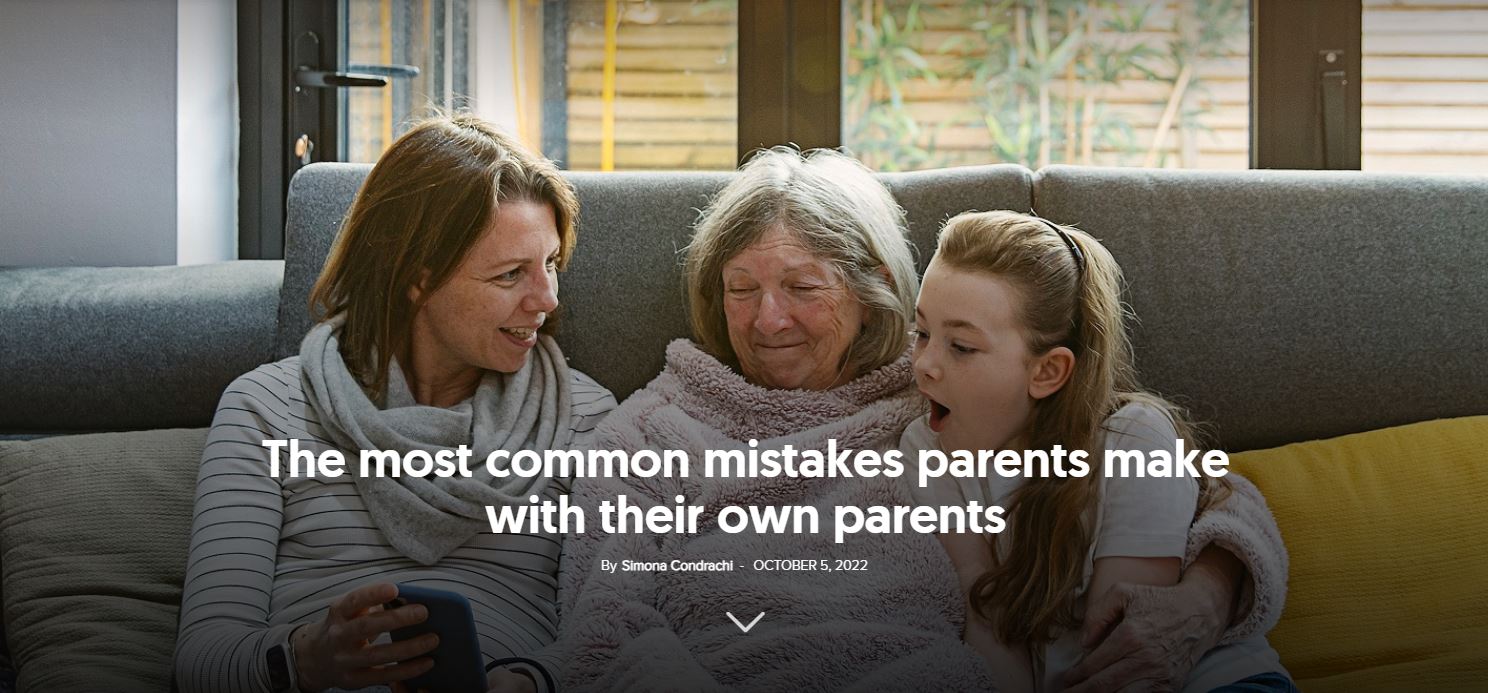I once heard on the radio a recommendation to help us understand the elderly: to attach some weights to our backs, hands and feet, put some blurred glasses on our noses, cotton wool in our ears, and then go to the market…
Such an image makes you wonder if, indeed, the young can understand the elderly around them and treat them appropriately, especially the elderly parents. How can we honour them, according to the biblical commandment, if we do not understand them?
Eloquent biblical wisdom
The Bible impartially gives us numerous examples of family dysfunctions, both between children and patriarchal parents, and between patriarchs and their wives. With the exception of a few commendable details about Job’s family, we have not found any family in the Bible that can serve as the ideal role model.
Moreover, experience shows us that sometimes even Christians who strive to live according to the biblical commandments encounter difficulties with two of these, which seem contradictory to them: “That is why a man leaves his father and mother and is united to his wife, and they become one flesh” (Genesis 2:24) and “Honour your father and your mother, so that you may live long in the land the Lord your God is giving you” (Exodus 20:12).
Are they indeed contradictory? Or should we reflect more deeply and allow ourselves to be enlightened in our family choices and attitudes by the Author of these commandments Himself? The stake is as important as possible: happiness in the extended family.
And yet, we find a model parent in the Bible: the father in the parable of the prodigal son (Luke 15:11-32). Can you imagine a more convincing expression of parental love than that embrace of the son, of a dirty body covered in rags—with a love that has crossed the millennia and is just as alive today? “While he was still a long way off, his father saw him and was filled with compassion for him; he ran to his son, threw his arms around him and kissed him” (Luke 15:20).
We have come to the conviction that in order to be truly parables, worthy of following, the stories of Jesus must have been inspired by real cases. Otherwise, anyone could reproach Him that the standards imposed by those parables were too high for human powers. We could imagine Him answering, “By no means! These parables were given to you and chosen among you, the people who once lived on earth, in a life like yours. Take the example of the father of the prodigal son.”
This perspective really prompts us to question our relationship with our parents and to seek healing and solutions to some problems that seem chronic or that we consider inherent in the filial relationship.
Typical impasses in the relationship between parents and children
We will talk about several types of impasses in the relationship between parents and children, which prevent the biblical honouring of parents. Here they are:
- Sometimes, there are situations when we unconsciously reproduce precisely the characteristics that we don’t like in our parents. We also become insistent, forgetful, intrusive, too “jumpy” or “all-knowing”; as if to confirm the popular saying that the apple doesn’t fall far from the tree.
- There is often the problem of the parents’ differentiated and unequal affection for the same child or for their other children (preferences, favouritism, neglect, injustices, and so on).
- There is a disruption in how mature children relate to their ageing parents, caused by them feeling indebted to their parents and not knowing how to pay off the “debt.” Other times, it is parents who reproach or make the children feel guilty for not being grateful enough for the sacrifices made to raise them.
- As mature children who left the nest, we are inclined to have a static and timeless vision of parents and even brothers and sisters, a vision that prevents us from healthy, creative, mature relationships that nurture feelings and enhance good interactions;
- A modern impasse: there is a tension between the biblical perspective about honouring parents and the psychological-psychoanalytic one about the relationship with parents (in which the problem of guilt and sin is not raised, and the dysfunctions of the adults have an explanation and originate in early childhood; this exonerates them from the feeling of culpability, but it can burden the parents with diffuse guilt, regardless of their actions—they must have done something wrong (“Why did you let me cry?” / “Why didn’t you let me cry?”; “Why did you give me advice?” / “Why didn’t you give me advice?” etc.).
- A discrepancy between the lack of financial autonomy of children and their moral freedom to make decisions: either parents condition them financially and interfere in the life decisions of adult children, or the children remain financially dependent on their parents forever but with the demand to do whatever they want.
Are there any Christian solutions?
Naturally, everyone has their own nuanced and personalised perspective on these dead-end situations. Anyone can invoke excuses, accusations, or hidden complexities, but the important aspect is to seek to mitigate these impasses with everything in our power and enjoy the life we share and the gift of filial relationships. Therefore, we propose a few suggestions for overcoming this problem, drawing inspiration from our own experience and that of others:
- Do not give up the fight against your own nature and your correctable flaws but also accept your insurmountable limitations, acknowledge age-related decline and be more understanding with those who are ahead of you by a few decades, because we are all on the same path.
- Accept that, although parents might not admit it, they do have preferences regarding children and treat them unequally. However, the fact that they don’t say it out loud shows that they are aware of the fact that it’s not fair, therefore they protect you by not saying it. Do you really want them to say to you, “Well, I admit, I like your brother better”? After all, what gives us the right to believe that we deserve more affection than we receive? Why not enjoy what we already have?
- Regarding the feeling of indebtedness for the many sacrifices made by our parents to raise us, we should understand for good that we will never be able to pay off our debt and a good parent doesn’t even expect that. We can try to ‘pay it forward’ by making the same sacrifices for our children and grandchildren, but we will never balance these invisible scales.
- Acknowledge that not it is not only us who change, but all people do. We must realise that, as time passes, we can transform into completely different people. It is important to always look for ways to build bridges, to maintain a connection with each other and not to fight in the present with our parents’ past versions.
- Realise that the endless psychoanalysis of life and memories is of no use to us if it falsifies and romanticises reality and if it does not show us what we are doing wrong and what to correct in ourselves. There is much more peace of mind in assuming the simple, biblical formula, without any “yes, but…”. Let’s honour our parents, period. And let’s leave to God all the psychological upheavals of parent-child relationships that are talked about in therapists’ offices. He is the true evaluator of wrongdoing and blame.
What does this honour that does us good entail?
- Appreciate them for who they still are and try to see them in their different ages and roles.
- Bring comfort to their souls, especially when they don’t feel well, by talking to them about their achievements and values, to help them feel useful and appreciated.
- Understand the futility of criticism or corrections. It is better to grant them the benefit of the doubt for their mistakes, as we grant this benefit to ourselves.
- Give up always being right or having the last word; it is a sign of maturity that yields much better results.
- Spend more quality time with them, as one does with their loved ones. Enjoy a time of soulful connection, positive emotions, pleasant surprises, and sharing beautiful experiences and memories.
- Hug them for a long time and caress them. They need touch more than we do because they experience it less often than we do.
- Listen to them attentively and actively.
- Don’t keep your feelings to yourself—tell them you love them. These words invigorate and soothe; they have life in them.
For the purpose of all these improvements, we should analyse ourselves and see how we relate to the child within us.
On the one hand, it is good to remain children in our souls and to preserve the good parts of a child’s soul: innocence, absence of envy, hatred, and rancour, openness to knowing others, curiosity in knowing the world, willingness to forgive and to reconcile, true love, transparency of feelings and thoughts, and a playful spirit.
All this makes the soul of an adult beautiful, alive and authentic. In this sense, Constantin Brâncuși said: “When we are no longer children we are already dead.” In the higher sense, of eternal life, Jesus recommended we become like little children in order to be worthy of the Kingdom of God (Mark 10:14-15).
On the other hand, we must give up what is undesirable in adult life, such as behaving “like a child” (1 Corinthians 13:11): with ignorance, lack of responsibility, ungratefulness, selfishness and self-indulgence. We must not demand to have everything that we want, believe that all good things come by themselves and we deserve them, and be uninterested in our surroundings.
However, in order to succeed in our endeavour, we must be aware of the source of the impasses and disruptions in all our relationships: the increasing coldness of the love we give to those around us.
On the Mount of Olives, Jesus told his disciples: “Because of the increase of wickedness, the love of most will grow cold” (Matthew 24:12). This is true of believers too. There is a causal relationship between the “increase of wickedness”—the sins we tolerate or encourage—and the fact that the “love of most will grow cold.”
Consequently, our true duty as children of the heavenly Father is to obey the Law, so that our transgressions may decrease and our love may increase. If we had faith the size of a mustard seed, we would move mountains. What are the dimensions of the seed of love inside us?
Corina Matei and Dumitru Borţun bring before our consciousness some of the main psychological upheavals in the relationship between mature children and their parents, proposing some improvements from a moral-spiritual perspective.




















